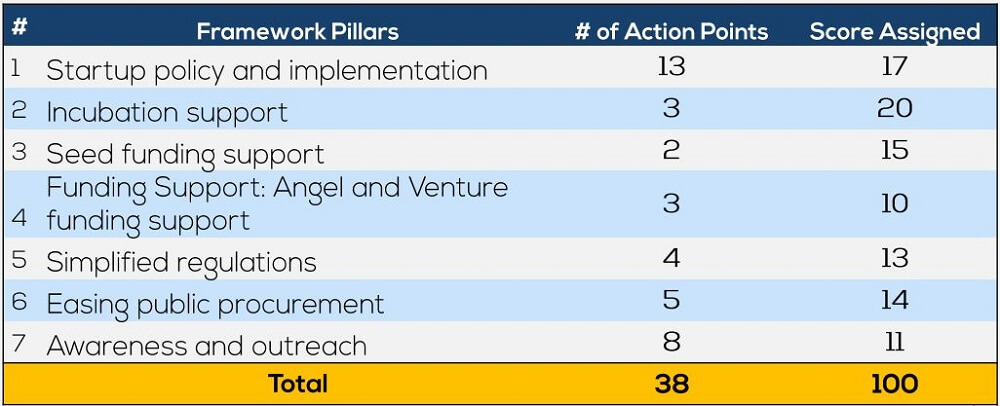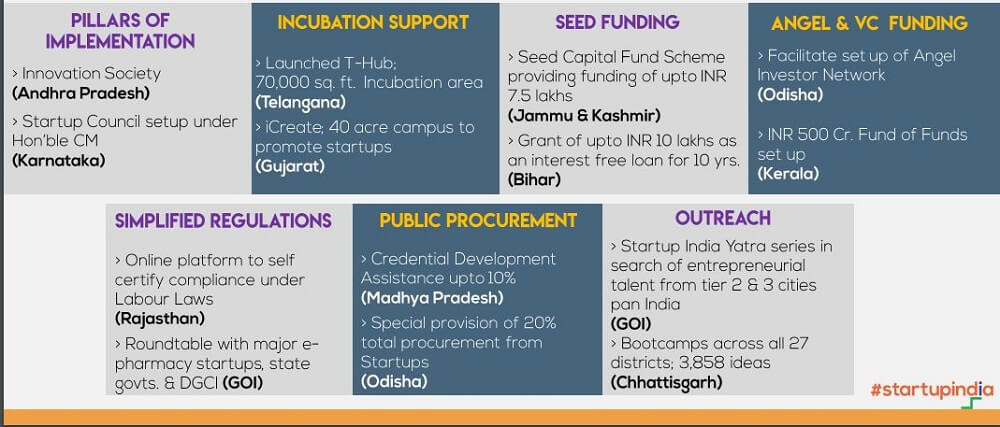
The Objective Behind State Startup Ranking Is to Foster Competitiveness And Promote Startup Ecosystem
The Department of Industrial Policy and Promotion, DIPP has finally announced the launch of the much-awaited State startup ranking framework.
In a press conference held earlier today, DIPP shared the objective behind ranking the Indian states’ startup ecosystem as well as revealed seven pillars with 38 pointers based on which each state will be ranked in June 2018.
In October 2017, DIPP appealed stakeholders to share their feedback about the states in implementing their startup policies until March 2018.
The said stakeholders include startups, mentors, investors, accelerators, incubators and the government bodies. A feedback mechanism has been opened on the official website of Startup India.
State Startup Ranking: Objectives And The Framework
DIPP aims to foster competitiveness and propel the Indian states and Union Territories to act proactively in the startup matters. It is believed that this ranking will help states in bring to the fore the progress made in their startup ecosystem. Another objective is to make different states learn and replicate good practices.
Here are the seven Pillars assigned by DIPP for evaluating the performance of a state’s startup ecosystem.

State Startup Ecosystem In India: Key Points To Consider
It is to be noted that ever since the announcement of Startup India Action Plan, till date, only 18 states have implemented startup policy.
The list includes Andhra Pradesh, Goa, Kerala, Rajasthan, Telangana, Karnataka, Odisha, Chhattisgarh, Gujarat, Bihar, Uttar Pradesh, Madhya Pradesh, West Bengal, Assam, Haryana, Punjab, Jharkhand, and Uttarakhand.
Of these, nine states including Delhi, Haryana, UP, Gujarat, Maharashtra, Karnataka, Kerala, Tamil Nadu and Telangana cover over 82% of the total 6875 DIPP recognised startups.
These 18 states together are mapping 95 best practices together that other states can follow.
For instance, under Pillars of Implementation, Andhra Pradesh has been quoted for its Innovation Society, while Karnataka has been recognised for the Startup council set up under Karnataka CM.

As per Inc42’s recently released Indian tech startup funding report 2017, Bengaluru took the top spot with 366 deals worth $7.5 Bn funding in 2017. The second spot was taken up by Delhi with a total investment of $4.3 Bn across 223 deals.
Mumbai, Hyderabad, and Pune took the third, fourth and the fifth rank respectively.
As far as Tier II and Tier III cities are concerned, the funding for these cities fell down by 46% with just 28 deals in comparison to 2016.
Here are some recent announcements from different state governments on implementing new funds and taking new initiatives to boost their startup ecosystem.
- Uttar Pradesh provided sustenance allowance of $236.09 (INR 15,000) per month for a period of one year at the idea stage. At the pilot stage, startups shall be provided marketing or commercialisation assistance of upto $20K (INR 10 Lakhs) to launch its prototype product and services in the market at the Pilot stage.
- Punjab formulated the ‘Punjab Startup and Entrepreneurship Development Policy 2017’ through which it supports women startuppers and entrepreneurs in the state to come forward and start their own ventures.
- Andhra Pradesh Chief Minister N. Chandrababu Naidu said to allot $15.6 Mn (INR 100 Cr) to create a separate startup fund for budding entrepreneurs.
- Uttar Pradesh Chief Minister Yogi Adityanath set up a $156.2 Mn (1000 Cr)startup fund for helping entrepreneurs in the state.
- North East Venture Fund was the first dedicated venture capital fund for the North-Eastern region. The size of the fund would be about $15.5 Mn (INR 100 Cr).
- Karnataka’s agriculture department set aside about $1.5 Mn (INR 10 Cr) fund to be administered by the information technology and biotechnology (ITBT) department. In March 2017, Priyank Kharge also announced a fund of $1.4 Mn (INR 10 Cr) for women entrepreneurs of the state.
- In March 2017, the Government of Bihar set up a startup fund as a trust, with an initial corpus of $76 Mn (INR 500 Cr)
State Startup Ranking: Will It Bring Hope For Tier 2 & Tier 3 City Startups?
In the Union Budget 2018, the government once again laid its impetus on the growth of startup ecosystem in the country. With India being a diverse country, and the entire process getting channelled through 29 state governments, the success in this mission can only be achieved if each state can bring out the best.
In recent years, DIPP has taken several initiatives to improve the ease of doing business and startup ecosystem in states. While the DIPP has already been ranking states based on Ease of Doing business, the Startup India Ranking will further help states to improve their startup ecosystems in their states.
So far, almost 18 states have introduced startup policies in their states. The upcoming ranking will also verify the policies and measures taken by these states.
For instance, Karnataka is expecting top rank owing to the various reforms it has taken. The state had previously identified ‘reducing various steps and online approval’ as the key reform to ease of doing business. According to DIPP’s SIA Index, Karnataka state currently accounts for the 44.4% of the total investments made in the country. For the past 17 years, the state has attracted $24.63 Bn FDI.
While all seems hail and hearty with a positive impact on one side, there is also another side to observe. In order to get ahead on the ranking, the states will aggressively try to fund more startups and hence demand more funding from the government, which can later create an imbalance in the process.
Further, in Tier 1 cities like Mumbai, Bengaluru, Delhi, the startup ecosystem is quite evolved and the entrepreneurs have ready access to even Private funding from VCs and angel investors.
However, the Tier 2 and Tier 3 cities have always been at a bit of disadvantage, wherein the government has to focus and work on the more grass-roots level.
With the State Startup Ranking framework in place, it will be interesting to watch what actions the states will now take to improve their ranking and who will get into the top 10 startup ecosystem list of DIPP.































 Ad-lite browsing experience
Ad-lite browsing experience